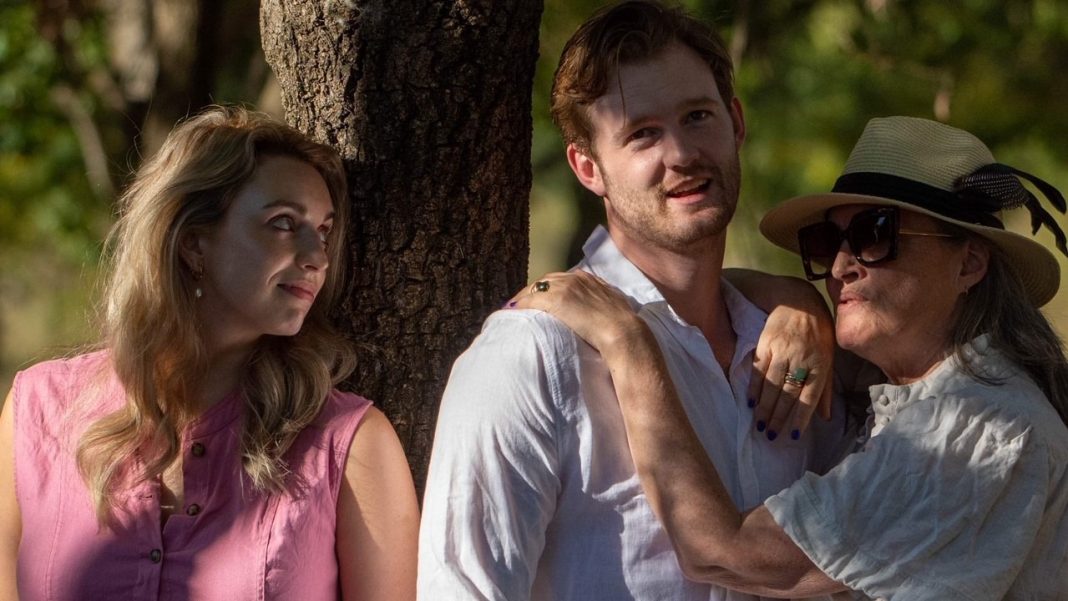On picnic blankets, audiences are invited to the grounds of ACT Hub for a site-specific rendition of a classic tale that will transport them to an idyllic countryside manor. Seagull flies into the Kingston location from 10-21 April.
Exploring the unfulfilled lives of artists, unrequited love and fame, the Anton Chekhov tragicomedy has been described as a play in which almost nothing happens, but everything happens. Through new introductions, homecomings, casual cruelties and lost love, Chekhov examines human nature and the impact we can have on one another.
“It’s about a bunch of people who know each other very well looking for love and being unable to find it or skipping love where it is,” says Caitlin Baker, director.
Ageing and beloved actress Irina returns to her family property with her lover Boris, a famous writer, who is scandalously younger than her. The arrival of the pair sends the residents into a spin. Ms Baker describes it as the catalyst for those there to reflect on whether they are happy or not with how their lives turned out. For those who discover life isn’t what they expected are they brave enough to change it?
“It is the story of a bunch of people learning how to live together when they’ve known each other for a very long time and also not being able to live together because they’ve known each other for a very long time. It is about art as well and how art interacts with the people you love,” says Ms Baker.
Translated and adapted into English by Karen Vickery, who also serves as assistant director, producer and plays Irina in the production, says that Chekhov is known for focusing on a group of settled people. Away from the city and big events of the world, these people are content until the outsiders cause a disruption. He then explores the crisis it creates and the dynamic within the group.
“How we operate as people within groups in which we are really familiar; families, extended families, closest friends and acquaintances. Everyone finds their place and tries to make the best of it but there is always jockeying for position and to be noticed and to be understood,” says Ms Vickery.

Chekhov’s writing style showcases how lives can be forever changed through seemingly small moments. Paraphrasing one of her favourite Chekhov quotes Ms Vickery says during something as inconsequential chatter at a group dinner, you can witness someone’s heart is being shattered and another’s happiness is being made.
“It reflects the way we live our lives, most of as are not running around being dramatic all over the place but big events happen to us in seemingly inconsequential ways,” says Ms Vickery.
Wanting to bring an Australian interpretation of the famous playwright to Canberra, Ms Vickery says his work is done on English and American stages, but something is lost in their renditions.
“The English have made it very pseudo-poetic and mournful and the Americans are too brash, too coarse in their interpretations. I think the truth is somewhere in the middle,” she says.
Bringing an Australian lens to the Russian work allows it speaks to us in the here and now as Chekhov had intended to speak to audiences when it was written in 1895. Seagull holds a special place for Ms. Vickery, marking her first grown-up taste of theatre. She says it has followed her throughout her career, even inspiring the name of her theatre company, Chaika Theatre, after ‘chayka,’ the Russian word for seagull.
A play about the arts and theatre with characters wanting to get better at their craft resonated with Ms Baker, who also wanted to get to know the work of Chekhov better. Like Russia, Australia is large with vast spaces of nothing, when you are in a rural area, you are truly alone. If you are in that aloneness with other people from which you have no escape, it can soon become claustrophobic.
“It forces people to just be with people… There’s this real sense in Seagull that everybody wants to leave the place except the person who isn’t from the place,” says Ms Baker.
A desire to leave isn’t always a reflection of the space or place, it can be a desire to leave a situation or make a drastic change in life and find happiness.
This will be the first adaption of Ms Vickery’s in a Canberra venue; she says ACT Hub was the perfect space for this play. The first act happens outside on the grounds of the property, like they would on an estate, before heading indoors for the second half where the Hub is transformed into the home.
“Because of its age and its location, it’s such a perfect venue for any Chekhov but in particular Seagull because of the lake,” says Ms Vickery.
A love that will never be returned, a son and mother who struggle with communication, and the reality that everyone is aging. Ms Baker says you can look into any rural Australian family and see similar experiences. She says the heart of the play is about loving each other and not being able to express it, find it or communicate it.
“All they want is either have someone love them or for someone to pay attention to them. It’s about them or their art, they are all people who don’t really know what they want from other people but are trying desperately to get it anyway,” says Ms Baker.
The exploration of the human experience is both deep and full of moments of laughter and life, the women hope the story will stay with people after they leave the venue. Particularly the way that casual cruelties can have devastating impacts.
“Things that we are not taking seriously at the time that are said or done can leave extraordinary marks,” says Ms Vickey.
They also agree that like it or not, the people closest to us are the most important, they hope that people will work away a bit more mindful of themselves and the people in their circles.
“I want them to think ‘Who have I not talked to in two weeks that I should have a chat with’,” says Ms Baker.
Catch Seagull on the stage and grounds of ACT Hub on 10-21 April; acthub.com.au
Canberra Daily is keen to hear from you about a story idea in the Canberra and surrounding region. Click here to submit a news tip.



